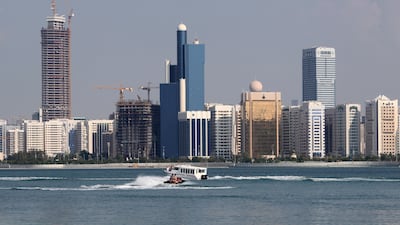UAE government revenues for the third quarter this year increased to Dh148.1 billion ($40.3 billion) from Dh126.3 billion in the same quarter last year, according to preliminary statistics from the Ministry of Finance.
Revenues from social contributions increased by 10 per cent to Dh3.8 billion in the July-September period from Dh3.4 billion in the same period last year, a ministry statement said on Wednesday.
The UAE economy is expected to grow by more than 6 per cent this year, after expanding by 3.8 per cent in 2021, supported by a rebound in tourism, construction and activity related to Expo 2020 Dubai, the International Monetary Fund said last month.
The latest data showed an increase in UAE’s government expenditures to Dh96.5 billion in the third quarter of 2022 from Dh91.8 billion in the same period last year.
Current expenditures increased by 7 per cent during the third quarter of 2022, to reach Dh93 billion, compared with the same period last year, the government statistics showed. They consist of workers’ wages, use of goods and services, consumption of fixed capital, paid interest, subsidies, grants, social benefits and other transfers.
The Emirates’ fiscal and external surpluses have increased this year, benefiting from higher oil prices, according to an IMF team that met with the UAE authorities from November 2 to November 17.
While oil prices have declined from well above $100 to about $80 a barrel this week due to a slowing global economy and a potential drop in demand from China, Brent, the benchmark for two thirds of the world’s crude, is still up 5 per cent in the year to date.
Business activity in the UAE’s non-oil private sector economy continued to improve in November with the seasonally adjusted S&P Global purchasing managers’ index clocking 54.4, way above the neutral 50 mark that separates growth from contraction.
The UAE's foreign trade in the first six months of this year exceeded Dh1 trillion ($272 billion), compared with Dh840 billion for the same period before the pandemic.

Tourism sector revenue topped Dh19 billion during the first half of this year and total hotel guests in the period reached 12 million.
The UAE economy made a strong rebound from the coronavirus pandemic-induced slowdown last year and the pace of economic momentum has continued to improve this year on the back of government initiatives and higher oil prices.
The country's economic output, which expanded 3.8 per cent in 2021, is expected to grow 5.4 per cent and 4.2 per cent in 2022 and 2023, respectively, according to the latest projections from the UAE Central Bank.
Emirates NBD recently raised its UAE growth forecast to 7 per cent in 2022, due to a higher estimate for the energy industry's output and the “robust growth” of its non-oil sector, setting up the country for its fastest annual expansion since 2011, when output grew by 6.9 per cent.
Last month, the IMF said that further advancement of planned fiscal reforms, including the expected introduction of corporate tax and gradual phasing out of business fee structures, will help to underpin growth and fiscal consolidation in the country.

